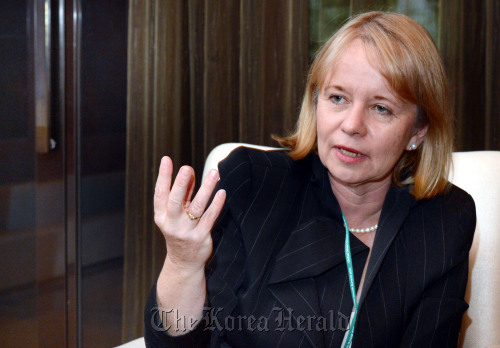Public-private partnership has been one of the effective ways to tackle global warming.
And financial companies have faced growing calls for playing a more active role in dealing with climate change as a majority of funding to sustain green growth will need to come from the private sector, while governments need to back it with sound policies.
Climate change is not a short-term issue, and financial companies should see it as more than just about project financing, said Gwen Andrews, vice president of environmental policy and global advocacy for Alstom, a French multinational company with power generation, transmission and transportation engineering businesses.
“There is not enough participation from the financial sector, and it needs to get more involved,” Andrews told The Korea Herald on Thursday.
She added that they should not be driven by the usual practices of seeking short-term returns on investment as clean energy infrastructure, which is essential part of economic growth, takes a long time to develop.
“Infrastructure is a very complex business. It’s all about building a new society, and energy underpins that society.”
The governments, meanwhile, should listen more to the private sector, which also knows what they need regarding policy support, and set a “strategic vision” on clean energy and transportation for enterprises to follow.
 |
Gwen Andrews, Alstom vice president |
“Policy support can mitigate risks enough that can lead to a large amount of private investment,” said Andrews. “Also, financing that is not fully commercial especially dealing with new technologies associated with risks is something that is needed.”
Alstom, which is best known in Korea as the provider of its bullet train technology for Korea’s high-speed railway KTX, is focusing on providing the “cleanest possible energy sources” by building highly efficient power plants, and smart cities and grids.
As the world is trying to move from its old fossil fuel paradigm to the green energy paradigm, Andrews said, “Alstom is going to be a major (technology) supplier in this transition.”
In this regard, it is investing in carbon capture and storage technology, and building a coal plant in Germany with a 46 percent of efficiency, above the global average of 30 percent, she noted.
It also has the technology to build a gas power plant with 61 percent of efficiency, while providing engineering in a wide range of renewable energy plants such as solar and wind.
Andrews’ major responsibility includes coordinating with the governments on effective environment policies as they are the major driver for the power generation and transmission industry.
By Park Hyong-ki (
hkp@heraldcorp.com)








![[Today’s K-pop] Blackpink’s Jennie, Lisa invited to Coachella as solo acts](http://res.heraldm.com/phpwas/restmb_idxmake.php?idx=644&simg=/content/image/2024/11/21/20241121050099_0.jpg)